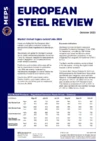UK government considers plan for domestic steelmaking
Primary steelmaking facilities in the United Kingdom have become increasingly reliant on financial support from the UK government, this year, leading to calls for greater nationalisation of the domestic steel sector.
In the first eight months of 2025, the UK’s current Labour administration has been forced to step in to safeguard the future of two of the country’s leading steelmaking operations, British Steel and Liberty Speciality Steels UK (SSUK).
Government ministers passed emergency legislation to take control of British Steel’s Scunthorpe facilities in April, after its Chinese owners, Jingye Group, revealed plans to close the site’s blast furnaces due to financial losses of GBP700,000 per day. Now the Department for Business and Trade is also responsible for the running of Liberty Steel’s South Yorkshire units, in Rotherham and Stocksbridge, after the High Court granted a compulsory winding up order.
Synergies between troubled steel facilities
Government representatives report that their preferred option for the long-term future of both companies is to seek new private ownership, while reserving the right to keep them in public hands as a means of last resort, if a buyer cannot be found.
Speculation has grown that the UK steelmaking facilities now receiving government support could be sold as one entity. History shows that there are clear synergies between the sites. All three were previously operated by Corus, and later Tata Steel, before Tata sold the Scunthorpe site to Greybull Capital in 2016 and its long products business to Liberty Steel in 2017.
The previous link-up of the operations enabled Tata to sell wire rod and engineering bar to domestic and export customers from the Rotherham, Scunthorpe and Stocksbridge facilities. Speciality Steels was also able to supply some of British Steel’s rolling lines via the EAF route, which is now preferred as a low-emissions form of steelmaking.
It was reported that all three steel production sites were loss-making at the time of Tata’s divestment of its UK business, however. Subsequent owners – competing with reduced global demand, low-cost imports and high energy costs – have failed to revive the financial fortunes of the operations.
In a recent interview on BBC radio, MEPS International’s head of price analysis and forecasts, Kaye Ayub, stated that the long-term financial viability of UK steel production remains in doubt. This is due to the high cost of manufacturing steel in the country.
“I think the UK government is trying to reorganise the steel industry and make the UK steel sector a viable entity going forward,” she said.
“Part of the issue is high costs in the UK. Domestic producers are having to contend with high electricity costs, reduced demand, and low-cost imports.”
Ayub added: “In the long term, I think the UK steel industry needs to rationalise and find ways of cutting costs.”
Previous government support
A precedent for nationalisation was set, in 2021, when the UK’s Ministry of Defence took ownership of the Sheffield Forgemasters steelworks under the previous Conservative government.
Government has already delivered significant financial support to the steel industry. In September last year, a joint agreement was made between Tata Steel and the UK government to invest in EAF-based steelmaking at Port Talbot, South Wales. The project will cost an estimated GBP1.25 billion, including a GBP500 million public grant. EAF-based steelmaking is part of Tata Steel’s decarbonisation programme and aligns with the UK’s net-zero ambitions.
Uncertainty about the future of domestic steelmaking in the UK comes less than two months after revisions to the country’s import safeguard measures tightened the tariff-rate quotas for steel. The UK government has consulted industry stakeholders on a replacement for the country’s safeguard measures, which expire in June next year.
Details of this, and wider plans for the UK’s steelmaking operations, could be announced within the UK government’s new Steel Strategy, which is due to be published later this year.
This, and potential plans to align the UK steel sector more closely are expected to be major talking points at the UK Metals Expo, at the NEC Birmingham, on September 10-11. MEPS representatives will be present throughout the two-day exhibition, at Stand B44.
Ayub, meanwhile, will be hosting panel debates on the country’s carbon steel and stainless steel markets. Last week, experts from across the UK’s steel supply chain shared their views on a “tough period” for the sector, ahead of the two discussions.

Source:
European Steel Review
The MEPS European Steel Review is an informative, concise and easy-to-use monthly publication, offering unique professional insight into European carbon steel prices.
Go to productRequest a free publication





